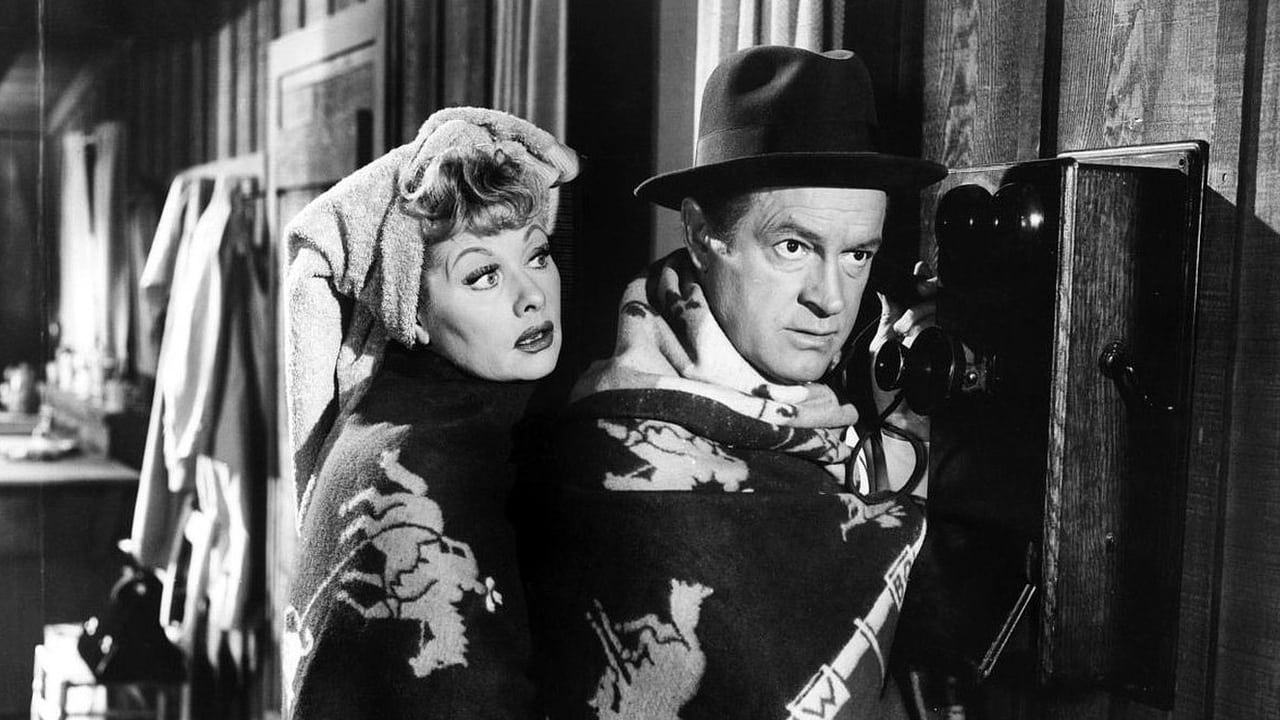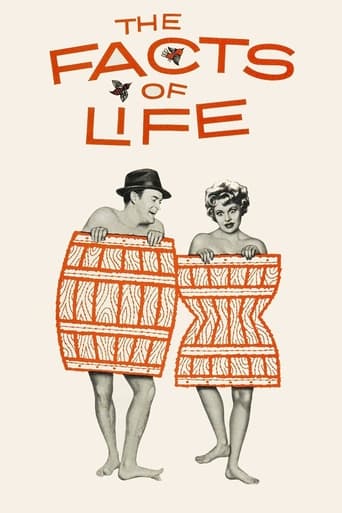

Unshakable, witty and deeply felt, the film will be paying emotional dividends for a long, long time.
... View MoreLet me be very fair here, this is not the best movie in my opinion. But, this movie is fun, it has purpose and is very enjoyable to watch.
... View MoreThe plot isn't so bad, but the pace of storytelling is too slow which makes people bored. Certain moments are so obvious and unnecessary for the main plot. I would've fast-forwarded those moments if it was an online streaming. The ending looks like implying a sequel, not sure if this movie will get one
... View MoreIt's simply great fun, a winsome film and an occasionally over-the-top luxury fantasy that never flags.
... View MoreDirected by Melvin Frank and written by Frank with Norman Panama, "The Facts of Life" is an adult love story that will surprise you. Frank & Panama are Bob Hope experts, multiple Oscar nominees and the creators of such classic comedies as "The Court Jester" and "Mr. Blandings Builds His Dream House".Kitty Weaver and Larry Gilbert are two perfectly nice suburbanites. If Kitty's husband (Don DeFore) seems a little preoccupied with work and his gambling habit, and Larry's wife (Ruth Hussey) a little too caught up with the kids - well, that's life. They have no thought of straying. They certainly have no thought of straying toward each other. However, Fate (in that way of hers) forces these two perfectly nice people to spend time together. Kitty discovers that "the jerk who tells the lousy jokes at the country club" is a genuinely warm and funny fellow. Larry sees a softer side to that stuck up Kitty. Love blossoms with the added complications of vows and conscience.How Larry and Kitty deal with their feelings, their need to be together and the realities of their lives is played out in a frank, touching and very funny manner. It is wonderful to see two actors who happen to be bona fide comic geniuses working together in such perfect sympathy. The humour of character and situation also involves some gut grabbing slapstick, and some quiet moments that will make you smile or sigh a sentimental sigh for two perfectly nice people.
... View MoreThis is a pretty good movie, as far as situation comedies go. Very typical of the movies Hope was making at that time. Pepole who have only seen the Hope and Crosby Road shows think Hops did only one-liner jokes, actually more of his movies were in the vein of this one. I watched all these movies when they came out in the theaters. I started watching Ball and Hope in movies when I was 8 years old, and they were young people. Mostly, I get a kick out of reading the reader comments. Mature for it's time, Advanced for movies made in that era etc. This was NOT considered a racy movie for the times. There were many with a much more " like today's movies" story line and script. The bedroom farce movies were being made and shown to general public audiences i the 40, and take a look at some of the movies made in the late 20s and 30s, before censorship stepped in. They didn't use swear words and the language they use today in movies in the 30s, but those people made some really "broad minded?" movies then. This was just a run of the mill, cutest movie of the times. If you liked Hope in this, you will also like, That Certain Feeling-- 1956-- Bob Hope and Eva Maire Saint The Iron Pettycoat---- 1956-- Bob Hope and Katherine Hepburn I'll Take Sweden------ 1965-- Bob Hope, Dina merrill You don't want to over look Bob Hope in Beau James--- 1957. Tis is the story of the flamboyant mayor of New York City.
... View MoreThis movie surprised me. I really enjoyed it. Lucy is stunning as a glamor star. She gets the soft focus and lighting, the glamor hair and makeup, but the showstopper is the glamor wardrobe. I've never seen her look more beautiful.I did not know that Lucy had made it so far in her movie career as to be able to star as a glamor girl, opposite Bob Hope yet. Another notch on the resume of this fascinating woman.My wife and I had just been discussing Lucy's talents as a straight actress and by coincidence this movie came on the next day. I had the opinion that Lucy was best in comedy and was not quite right in a straight role. This movie proved me wrong on that! She is convincing and when she kissed Bob I really believed it.Bob is also great. His comedy style here is more subtle than usual, playing funny bits off in a straight style without the usual hamming. The bit with the hankie made me belly laugh.The subject matter of this movie is similar to other movies of the early 60s as the sexual revolution was just starting...all clean and above board on the surface, yet doing their best to titillate us with sexual situations and innuendo. As I said in my review of Bob's "I'll Take Sweden," I find this juvenile and boring. There's no shock value left by now, so it falls flat. However, this movie tackles more serious subjects than simply titillating sex, namely the subjects of infidelity, marriage, and marital boredom. That is more interesting and even in 2005 I found the subject matter moving and thought-provoking.The script is tight and witty, with good dialog. The plot is also more or less water tight with plausible motivations.Good stuff....worth watching.
... View MoreI only saw the last half hour of this on TV and I can't wait to watch it from the beginning. This movie is hilarious and touching. Its a brilliant script and Bob Hope and Lucille Ball both show off their comedic talents. It had me both laughing and crying by the end, and what more can you ask from romantic comedy? Moral of the movie; respect your marriage. A winner.
... View More